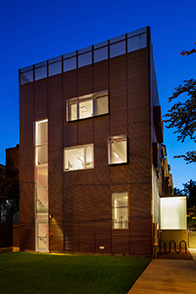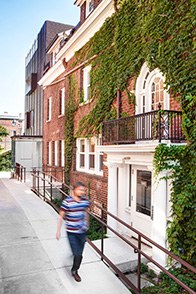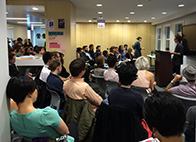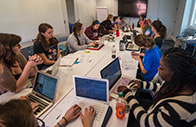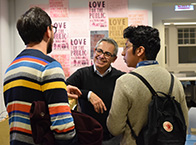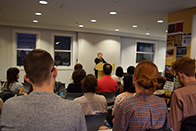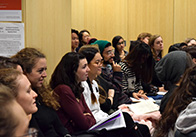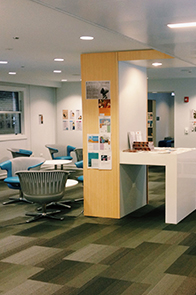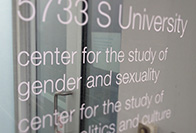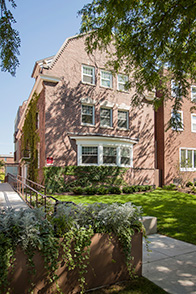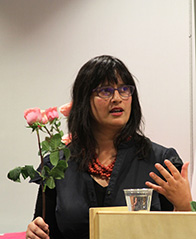Annual Lectures
The OUTstanding Speaker Series
The OUTstanding Speakers Series is an annual distinguished lecture series and student recognition ceremony, established and endowed by UChicago Pride Alumni (formerly the UChicago LGBT Alumni Network) in collaboration with the Center for the Study of Gender and Sexuality (CSGS). The series brings to campus scholars, professionals, and public figures who have made significant contributions to the LGBTQ community. Each year, the distinguished guest will deliver a public lecture and a seminar with UChicago students. Additionally, a student will be selected each year to receive the UChicago LGBTQ+ Community Engagement Award, to honor exceptional contributions that advance and support the interests of the LGBTQ+ community. At the public lecture, the awardee will speak about the significance of their work and introduce the invited distinguished speaker. The inaugural event was held in Fall 2022.
On Thursday, October 10 at 5:00pm we hosted the 2024 OUTstanding Speaker, Imani Rupert-Gordon (President, National Center for Lesbian Rights), who delivered the talk "The State of the LGBTQ Movement: What is at Stake, and How We are Going to Win." Imani was introduced by this year’s recipient of the UChicago LGBTQ Community Engagement Award, Pietro Juvara (Gender and Sexuality Studies and Law, Letters and Society, ’25). The full talk is available on to watch on our YouTube channel.
Past lectures:
- 2023: Jules Gill-Peterson, “Great Society Transsexualism: On the Political Economy of Transition”
- 2022: Victor Madrigal-Borloz, “From Wars Against Diversity To Inclusive Peace: Violence And Discrimination Based On Sexual Orientation And Gender Identity In Armed Conflict”
Iris Marion Young Distinguished Faculty Lecture
Each year, CSGS hosts the Iris Marion Young Distinguished Faculty Lecture featuring University of Chicago faculty doing innovative interdisciplinary work. On Monday, February 10 at 4:30pm, Larissa Brewer-García (Associate Professor, Romance Languages and Literatures) delivered the 2025 lecture “Gendered Exemplarity and Upward Mobility in the African Diaspora in Seventeenth-Century Peru.”
As part of its tenth anniversary celebration in 2006, the Center renamed this annual lecture to honor Iris Marion Young. Young was a professor of political science at the University of Chicago and was affiliated with the Center and the Human Rights program. She was a widely known and well-respected contemporary political and feminist social theorist, concerned with normative analysis of public policy. Learn more about Iris Marion Young.
Past speakers include: Kimberly Kay Hoang (Sociology), Waldo E. Johnson, Jr. (Crown Family School of Social Work, Policy and Practice), Rochona Majumdar (South Asian Languages and Civilizations and Cinema and Media Studies), Martha Feldman (Music), Jennifer Wild (Cinema and Media Studies and Romance Languages and Literatures), Linda Zerilli (Political Science), Daisy Delogu (Romance Languages & Literatures), Martha Nussbaum (Law/Philosophy), Jennifer Cole (Comparative Human Development), Deborah Nelson (English), Susan Gal (Anthropology), Leora Auslander (History), Cathy J. Cohen (Political Science), Mary Anne Case (Law), Lauren Berlant (English), Christine Stansell (History), Martha McClintock (Psychology/Comparative Human Development), Jean Comaroff (Anthropology), Amy Hollywood (Divinity), George Chauncey (History), Wendy Doniger (Divinity), Jacqueline Bhabha (Human Rights), and Saba Mahmood (Anthropology).
Lauren Berlant Memorial Lecture
To honor Prof. Lauren Berlant’s intellectual legacy, the Department of English and the Center for the Study of Gender and Sexuality propose a joint annual lecture series to start in Spring 2023. This annual lecture takes its form and inspiration from the Worlding, Writing project that Lauren ran for several years through 3CT and CSGS. The purpose of this project was, in Lauren’s words, “to explore new modes of writing and reading - not in an effort to affirm expertise but to imagine productive idioms for critical engagement and to assemble novel ways of attending to socio-political phenomena.” The invited speaker will be someone whose work draws on Lauren’s intellectual legacy, and/or who is pushing the boundaries of writing and reading in ways that resonate with the Worlding, Writing project. The speaker can be an academic, an artist, or an activist.
Kathleen Stewart (Anthropology, University of Texas at Austin) delivered the 2024 Lauren Berlant Memorial Lecture--“The Sensation of Singular Life”--on Thursday, October 24 at 5:00pm.
Past lectures:
Distinguished Alumnae/i Lectures
Each Spring, the CSGS welcomes a UChicago alumnae/i working in the field of gender and sexuality back to present their work.
On Thursday, May 1 at 5:00pm, Kavita Daiya (PhD, English, 2001; Professor of English and Women’s, Gender, and Sexuality Studies, The George Washington University) will deliver the 2025 Distinguished Alumni Lecture, “Migration, Representation, and Imaginings of Hope:”
This talk reflects upon the aesthetics and politics of storytelling across media about hidden histories of transnational displacement in the 20th and 21st centuries. Drawing upon intersectional feminisms and Critical Refugee Studies, linking Asia and the United States, I explore how migration stories-in contemporary graphic narratives, memoirs, and films-illuminate statelessness, border-crossing, and belonging. In the process, I suggest, this transnational cultural archive reorients conventional frameworks, creates new counterpublics, and inspires insurgent imaginings of hope.
Past lectures:
